Best AI Tools for Event Matchmaking and Networking in 2025

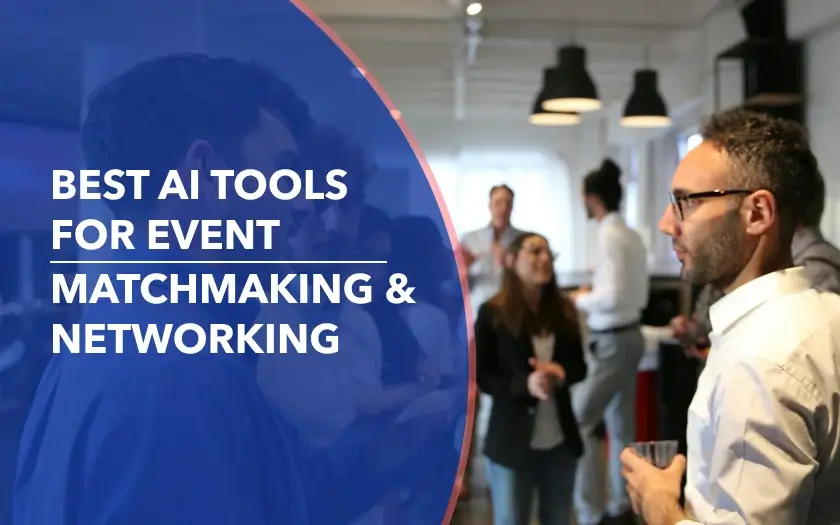
Artificial Intelligence (AI) has quietly become the behind-the-scenes superpower of modern events, be it in-person or on virtual event platforms. Today, AI tools for event matchmaking and networking help organizers connect the right people at the right time, for the right reasons. Its machine learning behavior makes networking feel less random and more intentional.
Whether you're hosting a global trade show, a niche startup summit, or a virtual meetup, the right AI event matchmaking and networking tool can transform your event from crowded to curated. This guide will walk you through the top platforms in 2025 that are doing just that. They are solving the networking problem with precision, personalization, and a whole lot of smart design.
{{table-of-contents}}
What Makes an Event Matchmaking and Networking Tool “AI-Powered”?
Not every tool that sorts people into categories is truly “AI-powered.” So, what separates a basic contact list from a smart networking engine?
At its core, an AI matchmaking tool doesn’t just filter attendees based on simple tags like industry or job title. Instead, it analyzes behavioral data, learns from user interactions, and dynamically adapts to improve the quality of connections over time.
Key AI Technologies at Play:
- Behavioral Analysis: Tracks actions like session clicks, profile views, meeting acceptances to build a deeper attendee profile.
- Machine Learning: Learns patterns in user behavior and preferences to refine future match suggestions.
- Smart Scheduling: Suggests meeting times and conversation pairings based on mutual availability, location, and intent.
What are the benefits of AI-Powered Event Matchmaking?

If we are being real, networking at events hasn’t always lived up to the hype. You show up, badge around your neck, coffee in hand, hopeful to meet the right person. But by the end of the day, your pocket is stuffed with business cards, your brain is fogged with small talk, and the one conversation that could’ve changed everything? It never happened.
Those with years in the event industry know this struggle all too well. For the longest time, we measured success by footfall, not by follow-up. In fact, 76% of event attendees say they attend primarily for networking, yet 67% of event organizers admit that delivering valuable networking opportunities is one of their biggest challenges. But in 2025, the rules have changed. We’re no longer relying on luck to create meaningful encounters; we’re using AI.
But, the benefits of AI matchmaking go beyond efficiency—they help create smarter, more significant interactions that align with your event’s goals.
Top AI Matchmaking and Networking Tools for Events in 2025
From intelligent recommendations to real-time scheduling, these platforms are leading the way in smarter, more intentional networking. Here’s a closer look at the best AI-powered event matchmaking and networking tools of 2025:
1. Remo (Networking Recommendations)
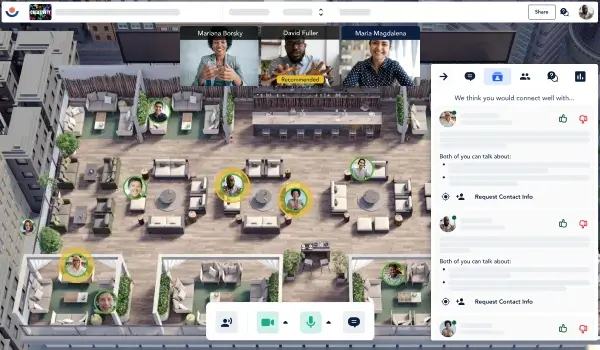
Remo is a virtual and hybrid event platform that enhances live networking with AI-powered recommendations. Its Networking Recommendations feature connects attendees based on shared interests, professional roles, and current networking goals. But it doesn’t stop at just recommendations. It also provides tailored conversation starters to help initiate insightful dialogue from the very first moment.
As a top-rated virtual networking platform, Remo is widely praised for delivering one of the closest experiences to in-person networking, all within an interactive online setting. Attendees can freely move between virtual tables, join group discussions, or hop into 1:1 conversations at their own pace. It’s a smarter way to network online, with all the benefits of virtual events, such as flexibility, wider reach, and personalized experiences.
Whether you're running a startup pitch night, a corporate mixer, or a multi-track hybrid conference, Remo helps attendees cut through the noise and focus on the people who actually add value to their journey.
How Remo’s AI Matchmaking Feature Works
- Before the event, attendees fill out a brief form sharing:
- Who they’re looking to meet (e.g., investors, collaborators, mentors).
- What they bring to the table (skills, insights, services).
- Their Linkedin profile to understand professional background and interests.
- Their company website
- Remo’s AI then analyzes this input and builds a list of recommended matches for personalized connections, complete with tailored talking points to make conversations smoother and more purposeful.
- At the event, each match is also highlighted with a "Recommended" badge, so it doesn’t interrupt the flow of your event but rather enhances the value attendees receive during networking times.
Key Features
- Purposeful Matching: Remo uses attendee-submitted goals and expertise to suggest connections who align with their needs. No endless scrolling or cold intros, just focused, curated networking.
- Smart Icebreakers: Each match comes with customized talking points based on mutual interests or goals. So instead of awkward “what do you do” moments, people dive into real conversation from the start.
- Spontaneous Networking: Remo enables attendees to move freely between virtual tables, just like at a real-world event. This fluid environment supports spontaneous conversations and unexpected introductions; key ingredients for authentic networking that go beyond pre-planned meetings or rigid match schedules.
- Scalable & Flexible Licensing: The feature can be purchased separately and used across multiple events, giving organizers control over when and how they want to use it.
- Manual Matchmaking: For organizers who want more control, Assigned Shuffle allows you to create manual pairings between attendees. It’s ideal for formats like speed networking or speed dating, where time-boxed, one-on-one interactions are scheduled and rotated seamlessly.
- Custom Floor Plans for Immersive Interaction: Remo lets organizers design immersive floor plans with custom layouts, table zones, and branded environments. This creates a sense of place, makes navigation intuitive, and influences networking flow by grouping certain attendee types, sponsors, or topics in specific zones, increasing the likelihood of meaningful matches.
- Presentation Mode: Remo also features a built-in Presentation Mode where speakers can deliver keynotes, panels, or workshops. Organizers can easily switch between structured sessions and freeform table interactions, all in the same event space.
Best For: Small to mid-sized virtual and hybrid events where organic but smart networking is a key component. Built for a variety of virtual event types, including social events, business networking events, and online conferences.
Pros and Cons
Pricing & Setup
- Remo offers three flexible pricing tiers—Subscription, One-Time, and Enterprise, designed to suit everything from single events to large-scale, recurring experiences.
- Networking Recommendations (AI matchmaking feature) is sold as an add-on to any Remo plan.
- Can be toggled on/off per event and reused across your event portfolio.
- Requires no third-party tools or manual data matching as it is fully integrated into the Remo platform.
According to a review posted on G2 by a user, Remo makes networking feel natural.
“When our team was searching for a platform to host this year's pinnacle event, Holidrag, our main criteria was to find something that would allow users to interact with one another in a similar way like an in-person event. Remo was the platform that exceeded our needs. Not only could people have intimate conversations, but they could also float between tables just like an in-person event…..allowing people to sit down and chat with one another as if they are right beside each other in person.”
- Geoff L, National Co-Chair Spectrum - a TELUS Employee Resource Group Enterprise
2. Grip
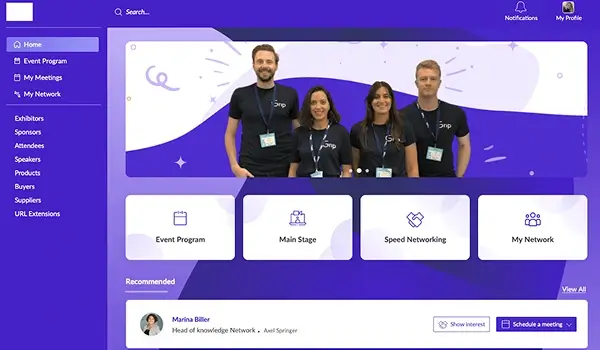
Grip is an AI-powered event networking platform designed to connect attendees, exhibitors, and sponsors in a targeted way, going beyond basic name-tag swaps by using behavioral data, stated goals, and mutual interests. Its award-winning mobile app speeds up introductions through instant chat, AI-suggested matches, and built-in meeting scheduling—all designed to streamline networking at high-touch events. The platform is built with exhibitor ROI and sponsor monetization in mind, offering tools like lead capture, branded meeting areas, and analytics to track the value of every interaction.
However, for new organizers, Grip can require a substantial setup time, typically up to four months, which may not suit fast-paced or short-notice events.
Key Features
- Advanced AI Matchmaking: Grip employs 16 machine learning strategies that consider both explicit attendee preferences and behavioral cues, such as profile clicks, session views, and calendar actions, to recommend high-quality matches. Similar to Remo, it collects attendee input ahead of the event to match people based on purpose and intent.
- Real-Time Feedback Loop: Recommendations evolve based on live user actions like “Interested” or “Skip,” refining matches throughout the event. Unlike Remo, however, it doesn't surface in-the-moment prompts like recommended labels or hover-based talking points during interactions.
- Pre-Scheduled Meetings (MustMeet): Attendees can easily book 1:1 or group meetings, minimizing back-and-forth scheduling.
- Exhibitor & Sponsor Tools: Features include lead capture, badge scanning, profile boosts, and robust ROI tracking, making it a strong choice for monetization-focused events. These tools feed into the matchmaking loop by helping exhibitors and sponsors measure impact, follow up with prospects efficiently, and justify future investments.
Best For: Large B2B conferences, trade shows, hosted buyer formats, and expos where purpose-driven business interactions are the primary objective.
Pros and Cons
Pricing & Setup
- Pricing is custom based on event size and features.
- Generally includes per-event licensing and/or annual application fees.
- It typically costs in the high five‑figure range, making it more suitable for major enterprise-level events.
- Unlike Remo, Grip’s onboarding and activation process is more resource-heavy and less turnkey for smaller or quick-deployment events; implementation takes around 4 months, with ROI typically achieved in 17 months.
3. Brella
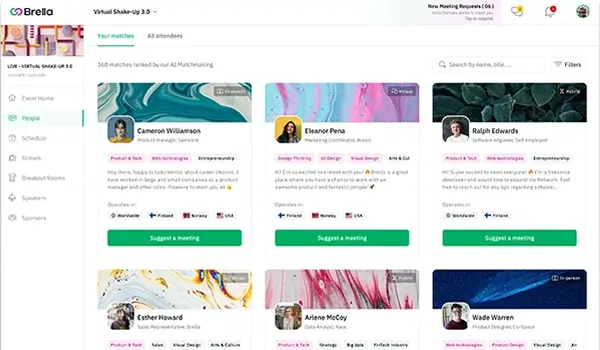
Brella uses smart, intent-based AI to match attendees by understanding their goals, interests, and how they interact during the event. It’s like having a virtual networking assistant that helps you meet the right people, without having to scroll endlessly or hope for the best. Brella supports two-sided networking, making it ideal for structured events where two distinct attendee groups (like exhibitors and attendees) need to be matched efficiently and meaningfully.
However, some users have noted that its customization options can be limited if your event has highly specific or niche matchmaking needs.
Key Features
- AI-Powered Matchmaking: Brella analyzes attendee goals, profile data, browsing behavior, and interaction history to generate personalized connection recommendations. Its machine learning model improves match accuracy as the event progresses, similar to Remo’s pre-event form and behavioral insight combo, though without real-time visual prompts or icebreakers.
- Smart Meeting Scheduling: Attendees can easily book 1:1 or group meetings through AI-suggested slots based on mutual availability and aligned interests. Features include calendar sync, built-in chat, meeting ratings and group meeting support to enhance engagement during the event.
- White‑Label Mobile App & Branding: Offers a customizable interface (iOS, Android, and web) with event-specific onboarding and theme support.
- Flexible Integrations: Connects seamlessly with CRMs (e.g. Salesforce, HubSpot), registration tools, and platforms like Eventbrite, Swoogo, Tito, and WooCommerce.
Best For: B2B events with 2 well-defined attendee segments, such as exhibitions or trade shows.
Pros and Cons
Pricing & Setup
- Pricing is customized per event, based on attendee size, features, and integrations; no standard pricing tiers publicly listed.
- Tailored for mid-sized to large events with networking-intensive requirements, typically carrying a premium investment.
- Manual setup and onboarding may require extra planning effort and time.
4. Swapcard
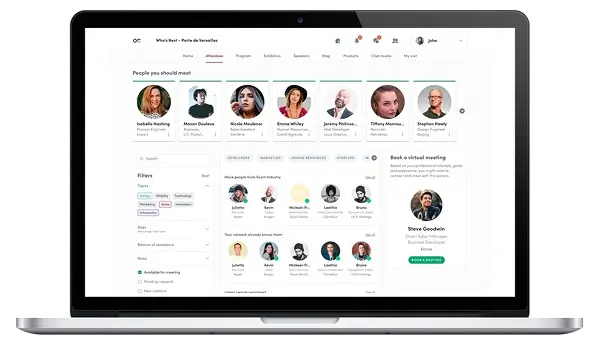
Swapcard is an all-in-one event platform that makes networking feel natural by using built-in AI to recommend the right people, sessions, exhibitors, and content, based on what you’re genuinely interested in and how you engage. It’s not just about clicking buttons; the system actually learns from user behavior to make smarter suggestions over time. It does this by tracking patterns in choices, interactions, and outcomes, then using that data to refine future recommendations.
However, Swapcard's customization options, such as visual branding or layout flexibility, are somewhat limited compared to more immersive platforms. In contrast, Remo steps in with highly customizable virtual tables and environments that offer much more control over look and feel while still enabling immersive, AI-enhanced networking.
Key Features
- AI Smart Meeting Generator: Swapcard uses a graph-based AI engine that evaluates attendee profiles, interactions, interests, and goals to generate smart meeting suggestions for people, sessions and sponsors.
- Behavior-Based Learning: The system evolves as attendees interact. Profile views, session attendance, meeting requests, and content engagement all refine the matchmaking algorithm in real time to deliver more personalized experiences.
- Monetization & Sponsor Tools: Features like lead capture, profile boosting, messaging, and in-depth sponsor analytics don’t just generate ROI, they keep sponsors and exhibitors actively engaging with attendees who are most relevant to them, ensuring networking efforts translate into measurable business outcomes.
- Rich Integrations & API Access: By syncing seamlessly with CRMs, email marketing tools, and analytics platforms, and offering a public API for custom workflows, Swapcard ensures networking and matchmaking data flows smoothly into organizers’ existing systems.
Best For: B2B conferences, trade shows, industry expos, and organizations building long‑term engagement or communities.
Pros and Cons
Pricing & Setup
- Swapcard offers structured plans (Starter, Professional, and Enterprise) starting at €520/year, with pricing scaling based on attendee count, features, and support levels.
- Implementation times vary depending on complexity; initial setup tends to be shorter for small-to-mid sized events but can extend with customization.
5. Jublia
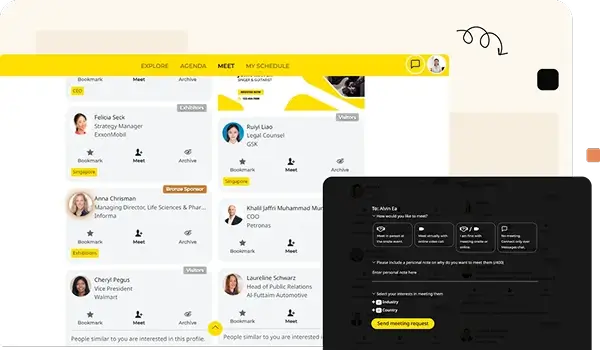
Jublia is a smart event platform designed to make B2B networking more structured, efficient, and measurable. It enables attendees to connect with the right people, book relevant meetings, and follow through with conversations that drive ROI.
However, there’s a learning curve to fully unlock features, especially for first-time organizers utilizing granular scheduling and analytic modules.
Key Features
- 360° AI-Powered Matchmaking: Custom-built for B2B engagement formats, Jublia’s system recommends connections based on attendee profiles, stated objectives, and behavioral signals like bookmarks, content interactions, and meeting requests.
- Meeting Tools & Communication Hub: Attendees can schedule 1:1 or group meetings, exchange documents, use instant messaging, and sync calendars, all within a responsive native or web app.
- Content & Exhibitor Management: Jublia offers a searchable exhibitor directory, AI-generated event maps, and support for live and on-demand content (e.g. videos, livestreams, PDFs). Sponsors benefit from built-in visibility tools to boost engagement.
- Session Recommendations: Beyond networking recommendations, Jubila also offers personalized content and exhibitor suggestions as well. Using the same algorithm, it recommends which sessions or companies an attendee would find most interesting or relevant.
Best For: Structured B2B networking events, particularly expos, hosted buyer summits, and corporate conferences, where organizers want to deliver high ROI and engaging meetings.
Pros and Cons
Pricing & Setup
- Pricing is quote-based, tailored to event size, matchmaking complexity, app requirements, and integration needs. There’s no public base-tier pricing available.
- It’s best suited for mid-to-large scale B2B events.
- Onboarding timelines vary, but events leveraging Jublia often benefit from a structured, consultative implementation process, particularly when using hybrid or global formats.
6. ConversationStarter
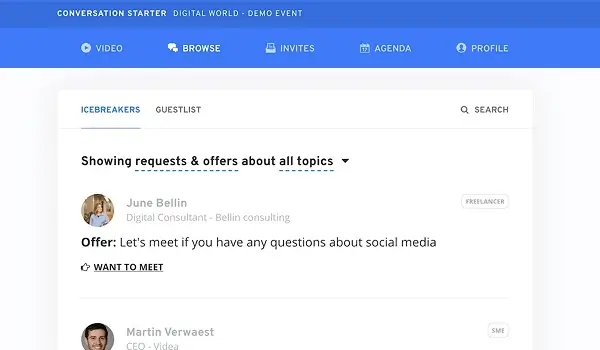
Conversation Starter is a purpose-built networking platform focused on creating meaningful 1:1 meetings between attendees at virtual, hybrid, or in-person events. Rather than leaving connections to chance, it helps organizers curate high-value interactions through structured matchmaking.
However, it’s not intended for large-scale expos or exhibitor-heavy trade shows. Its strength lies in intimate sessions rather than managing complex agendas or multi-layered networking setups.
Key Features
- AI Matchmaking with Goal-Based Pairing: Attendees share who they want to meet and what they can offer. The platform automatically matches them based on aligned goals and interests, making the process simple and focused.
- Smart Scheduling & Personalized Agendas: Unlike Remo, which offers a mix of structure and spontaneity—letting attendees explore connections naturally—Conversation Starter leans fully into pre-planned agendas for each attendee before the event, complete with confirmed meetings, calendar sync, and reminders.
- Mutual Match Control: Participants can view potential matches and accept or decline meeting invites, ensuring meetings are mutually relevant.
- Conversation Tools & Recaps: Includes in-platform messaging, calendar reminders, and personalized schedules. Attendees can track who they met and when, while organizers receive post-event data on participant interactions and networking outcomes.
Best For: Structured B2B networking, community gatherings, alumni meetups, early-stage investor meetups, or any event where attendees want to dive right into purposeful conversations.
Pros and Cons
Pricing & Setup
- Conversation Starter offers a flat one-time event fee (starting near €1,100).
- New events benefit from an onboarding coach and guided setup for scheduling, branding, and messaging features.
7. Bizzabo
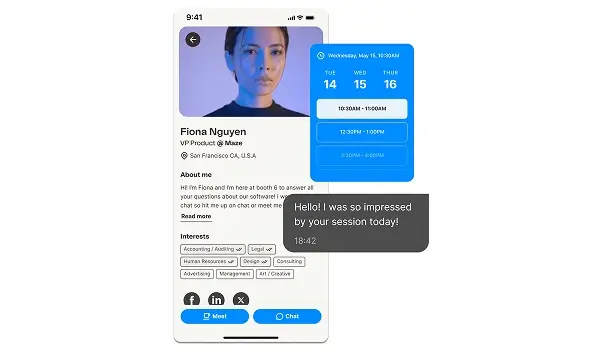
Bizzabo is a full-stack event platform that combines registration, marketing, networking, analytics, and engagement, eliminating the need for multiple separate tools. Its AI matchmaking connects attendees to the right people, sessions, and exhibitors by analyzing interest tags, registration details, and in-event behavior.
While Bizzabo offers an all-in-one experience, its registration system can be inflexible, especially for customizing criteria or emails. This can make it harder to capture detailed attendee information, which in turn limits the accuracy of AI-powered matchmaking. In contrast, Remo takes a lighter, more flexible approach here, using optional fields for LinkedIn and a company website to capture meaningful attendee information upfront, which fuels more accurate real‑time recommendations without adding registration friction.
To find out more, check out Bizzabo’s review on our blog.
Key Features
- AI Matchmaking Across the Event Journey: Bizzabo’s matchmaking analyzes attendee behavior, from registration to in-event engagement, to offer connection suggestions that feel natural and relevant. Attendees can discover matches, schedule meetings, and sync agendas via both web and mobile.
- Integrated Networking Suite: Native 1:1 matchmaking, guided introductions, and calendar-aware scheduling tools are built into the Event Experience OS, helping attendees connect without switching platforms.
- Customizable Scheduling: Supports time blocking and location-aware meeting flows so key sessions don’t overlap, and attendees stay on schedule.
- Real-Time Analytics: Organizers gain insights into registration performance, attendee engagement, meetings scheduled, and overall ROI from networking, though some users report needing support to access advanced exports or custom reporting.
Best For: Mid-to-large B2B events, marketing conferences, and hybrid formats, especially those focused on driving meaningful connections and measurable outcomes.
Pros and Cons
Pricing & Setup
- Pricing is enterprise-level and custom, based on event size and feature set. Bizzabo typically targets mid-to-large organizations with annual contracts. So, if you’re a small business or looking to organize a smaller event, this may not be the best tool for you.
- Due to its scale and functionality, getting fully set up may require a dedicated setup period. In contrast, Remo offers faster setup, event-level feature toggles, and a lighter footprint, making it more suitable for lean teams or mid-sized events looking to launch quickly without sacrificing networking quality.
8. Let’s Get Digital
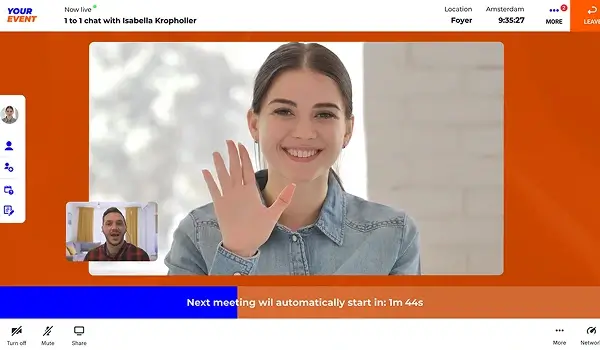
Let’s Get Digital is an integrated platform for virtual, hybrid, and in-person events, combining registration, lead tools, and attendee engagement within a single system. Whether you organize industry expos or curated summits, it’s designed to help attendees meet the right people effortlessly, while organizers benefit from streamlined operations and engagement tracking.
A common drawback noted by users of Let’s Get Digital is the lag and confusion in the chat feature, attendees often aren’t sure where conversations are taking place, especially during live sessions, leading to disjointed interactions. This can disrupt networking flow and hinder smooth conversation during high-engagement moments.
Key Features
- AI-Powered Match Suggestions: Let’s Get Digital’s AI-powered matchmaking uses a combination of registration data (e.g. interests, job roles, networking goals) and in-event behavioral signals (like swipes, meeting activity, and profile views) to generate tailored connection suggestions.
- Smart Swipe-to-Match Interface: Attendees are shown potential matches in a swipeable carousel, where they can accept and schedule meetings in a single flow.
- Real-Time Profile Refinement & Feedback Loop: If attendee profiles lack sufficient data, the system prompts users to update their information. This keeps match suggestions relevant and improves accuracy as the event progresses.
- Personalized Match Rounds & Icebreakers: Organizers can set up curated matchmaking windows ("match rounds"), during which top matches are surfaced with context-specific talking prompts to help break the ice and start meaningful conversations.
Best For: B2B expos, conference networking sessions, and hybrid event formats where smart matchmaking adds real value and helps stakeholders maximize sponsor ROI.
Pros and Cons
Pricing & Setup
- Pricing is modular and flexible with per-attendee pricing tiers for larger deployments (around €4.50/attendee).
- Platform setup is generally straightforward; most events are live within hours to days depending on complexity, aided by an onboarding checklist and consultant support.
How to Choose the Right AI Event Matchmaking and Networking Tool
Not every tool will fit every event and that’s okay. The key is to find a platform that aligns with your event’s purpose and your audience’s expectations. Here’s how to narrow it down:
- Start with Clear Goals: Are you optimizing for lead generation, high-quality networking, learning engagement, or conversion? Your objective should shape the kind of matchmaking experience you need.
- Know Your Attendees: Do they expect a guided experience with curated matches and prompts, or do they prefer to explore and connect on their own? Understanding their behavior helps match the right tool to their comfort zone.
- Think Long-Term: Scalability. If you’re running multiple events, choose a platform that can grow with you. Look for features that support recurring or large-scale events and ensure it integrates smoothly with CRMs, registration systems, virtual platforms, and analytics dashboards to handle increased complexity.
- Consider Pricing Models: Some tools are geared toward enterprise budgets and annual contracts, while others, like Remo, offer more flexible, event-level pricing and faster setup, making them a strong fit for small to mid-sized teams looking for scalability without heavy upfront commitments.
- Test What Matters Most: Before you commit, compare tools based on practical features like:
- Smart Reminders: Nudging attendees about meetings or suggested connections
- Sponsor Matchmaking: Boosting value for exhibitors and partners
- Feedback Loops: Using attendee input to improve recommendations mid-event
- Profile Personalization: Adapting matches based on user input and behavior
The best AI tool works for you and grows with your event strategy. Make sure it fits your goals, not just your tech stack.
Top Tools, Trusted Results
AI event networking and matchmaking tools are quietly transforming the networking experience, shifting it from luck-of-the-draw to data-driven, personalized engagement. The result? Stronger conversations, higher ROI, and attendees who leave with real value.
If you’re planning your next hybrid, in-person, or virtual experience, make sure your platform doesn’t just support connections but engineers them.
That’s where Remo stands out. With immersive, interactive event spaces and robust AI-powered features, Remo isn’t just a platform—it’s a conversation catalyst. Whether you're hosting a deal-focused B2B summit or a community-driven meetup, Remo gives your attendees a place to connect, engage, and grow. Book a demo today because when the right people connect, amazing things happen.
Frequently Asked Questions (FAQs) about AI Tools for Event Matchmaking and Networking
1. How is AI different from regular event networking tools?
Traditional tools rely on manual filtering or random pairings. AI-powered tools analyze deeper patterns, such as behavior, preferences, and engagement, to create smarter, more personalized recommendations.
2. Do these tools work for both virtual and in-person events?
Yes. Many platforms like Brella, Let’s Get Digital, and Remo offer hybrid compatibility, meaning they support AI matchmaking for virtual, in-person, and hybrid formats.
3. How do these platforms protect attendee data?
Reputable platforms follow GDPR and other privacy regulations. Attendees typically consent to using their info for matchmaking, and data is anonymized or encrypted when necessary.
4. Can sponsors benefit from AI matchmaking too?
Absolutely. Some platforms offer sponsor matchmaking features, pairing sponsors with attendees who match their target demographics or interests, boosting engagement and conversion.







.webp)




















